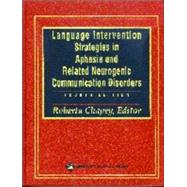
Note: Supplemental materials are not guaranteed with Rental or Used book purchases.
Purchase Benefits
What is included with this book?
| Section I. BASIC CONSIDERATIONS | |||||
|
3 | (15) | |||
|
|||||
|
|||||
|
18 | (19) | |||
|
|||||
|
37 | (18) | |||
|
|||||
|
|||||
|
55 | (74) | |||
|
|||||
|
|||||
|
119 | (5) | |||
|
124 | (1) | |||
|
125 | (4) | |||
| Section II. PRINCIPLES OF LANGUAGE INTERVENTION | |||||
|
129 | (19) | |||
|
|||||
|
|||||
|
148 | (25) | |||
|
|||||
|
|||||
|
173 | (21) | |||
|
|||||
|
|||||
|
194 | (14) | |||
|
|||||
|
208 | (27) | |||
|
|||||
|
230 | (5) | |||
| Section III. PSYCHOSOCIAL/FUNCTIONAL APPROACHES TO INTERVENTION: FOCUS ON IMPROVING ABILITY TO PERFORM COMMUNICATION ACTIVITIES OF DAILY LIVING | |||||
|
235 | (11) | |||
|
|||||
|
|||||
|
|||||
|
|||||
|
|||||
|
|||||
|
|||||
|
246 | (23) | |||
|
|||||
|
267 | (1) | |||
|
268 | (1) | |||
|
269 | (28) | |||
|
|||||
|
297 | (19) | |||
|
|||||
|
|||||
|
316 | (25) | |||
|
|||||
|
|||||
| Section IV. TRADITIONAL APPROACHES TO LANGUAGE INTERVENTION | |||||
| A. Stimulation Approaches | |||||
|
341 | (42) | |||
|
|||||
|
|||||
|
383 | (14) | |||
|
|||||
|
|||||
|
392 | (5) | |||
|
397 | (38) | |||
|
|||||
|
435 | (22) | |||
|
|||||
|
457 | (15) | |||
|
|||||
|
|||||
|
472 | (15) | |||
|
|||||
|
|||||
|
487 | (26) | |||
|
|||||
| B. Cognitive Neuropsychological Approaches to Treatment of Language Disorders | |||||
|
513 | (11) | |||
|
|||||
|
522 | (2) | |||
|
524 | (27) | |||
|
|||||
|
|||||
|
549 | (2) | |||
|
551 | (21) | |||
|
|||||
|
|||||
|
572 | (33) | |||
|
|||||
|
|||||
|
596 | (8) | |||
|
604 | (1) | |||
| C. Cognitive Neurolinguistic Approaches to Treatment of Language Disorders | |||||
|
605 | (24) | |||
|
|||||
|
625 | (1) | |||
|
626 | (1) | |||
|
626 | (3) | |||
|
629 | (34) | |||
|
|||||
|
|||||
|
661 | (1) | |||
|
662 | (1) | |||
|
663 | (12) | |||
|
|||||
| D. Specilized Interventions for Aphasic Patients | |||||
|
675 | (13) | |||
|
|||||
|
|||||
|
|||||
|
|||||
|
688 | (15) | |||
|
|||||
|
701 | (2) | |||
|
703 | (15) | |||
|
|||||
|
718 | (27) | |||
|
|||||
|
739 | (1) | |||
|
740 | (5) | |||
| Section V. THERAPY FOR ASSOCIATED NEUROPATHOLOGIES OF SPEECH AND LANGUAGE RELATED FUNCTIONS | |||||
|
745 | (64) | |||
|
|||||
|
|||||
|
|||||
|
801 | (2) | |||
|
803 | (2) | |||
|
805 | (1) | |||
|
806 | (3) | |||
|
809 | (20) | |||
|
|||||
|
828 | (1) | |||
|
829 | (18) | |||
|
|||||
|
|||||
|
847 | (38) | |||
|
|||||
|
|||||
|
|||||
|
882 | (2) | |||
|
884 | (1) | |||
|
884 | (1) | |||
| Subject Index | 885 | (19) | |||
| Author Index | 904 |
The New copy of this book will include any supplemental materials advertised. Please check the title of the book to determine if it should include any access cards, study guides, lab manuals, CDs, etc.
The Used, Rental and eBook copies of this book are not guaranteed to include any supplemental materials. Typically, only the book itself is included. This is true even if the title states it includes any access cards, study guides, lab manuals, CDs, etc.